Law Professor Fran Quigley says that his Substack newsletter “is the product of frustration.” A 3.15.2023 post about Quigley on the Indiana University Robert H. McKinney School of Law website says he recently presented at “Manchester University on Housing as a Human Right.” It said in part that “Quigley, who directs the Health and Human Rights Clinic at IU McKinney, talked about housing problems in the United States and how to respond to these challenges by looking at social housing as a more equitable, affordable path. He also discussed how religious communities can help housing to be seen as a human right.” The question of housing as a right, necessity, and access to affordable homes are a perennially important topic, and Quigley recently posted on his Substack on manufactured homes and communities in a post entitled on the Jacobin website: “Wall Street Is Holding a Gun to Mobile Home Residents’ Heads.” Note that the Jacobin’s self-description includes the claim that it is “is a leading voice of the American left,” holding what some would call progressive views and what the Jacobin says of itself as “offering socialist perspectives on politics, economics, and culture.”
The largely the same article on Quigley’s Substack is entitled: “How Wall Street Holds a Gun to the Head of Manufactured Home Residents.” More on that near the end of this post.
Before diving into his remarks about mobile and manufactured homes, which he routinely referred to as “mobile homes,” some additional context is useful.
In an email about his Substack newsletter, Quigley said: “I have represented Natasha and Amanda and Kenneth, and hundreds more people going through similar struggles, in eviction courts in my hometown of Indianapolis. I teach a law school clinic at Indiana University McKinney School of Law, where my students and I go to court each week and advocate for tenants facing eviction.”
Quigley said: “Their experience is horrible to witness; it is far worse to endure. It should not be happening. Thus, the frustration. But along with the frustration comes some hope: We can fix this. In our clinic, advocating for individual tenants has led to us also pushing to change the system that is crushing them.” Quigley is among others from across the political spectrum that has raised such concerns. More on that in Part II of this report and analysis, further below.
Part I
The first paragraph in Quigley’s post imprecisely entitled “Wall Street Is Holding a Gun to Mobile Home Residents’ Heads” said the following.
“In mobile home parks around the country, millions of tenants and owners are being mercilessly exploited and regularly evicted, often by giant Wall Street firms like Blackstone.”
“In the Indianapolis eviction court where my students and I work, Jessica and her family come to court in a panic.” Quigley relates his insights into her experiences of trying to get caught up on payment for the home’s site following a bout of COVID19, which he makes clear are not unique. “It is more of a shakedown than a negotiation, but Jessica sees no choice but to agree again. “We’ll just have to figure out how to get the money,” she tells me. “We can’t risk getting evicted.”
Quigley noted that: “Jessica paying $37,000 for her home fifteen years ago and putting thousands of dollars and countless hours into improvements, including an attached deck on the back. But they don’t own the land under their home, the “lot” it sits on. For that space, the landlord charges them $470 per month.” His post said: Jessica’s home has sat on the lot for more than three decades and she is not at all confident that it can be relocated intact. “If we get evicted, we lose everything we have worked for,” she says. Her landlords are aware.” As a relevant segue, it should be noted that based on the fact that her home is roughly three decades old, the indications are that her home is a manufactured home, and not a mobile home. For more on that, see the report linked below.
That point of correct terminology noted, Jessica’s home would have been built to the federal standards established by the HUD Code for manufactured housing. Properly maintained, the home should be structurally sound – and her referenced remark aside, a secondary move may not be a problem, save for the cost. That cost of moving is a legitimate concern for many if not most manufactured homeowners who live in a land-lease community when faced with the type of eviction threat Quigley asserted.
Jessica and those like her are “all but forced to pay whatever price their landlords decide to charge,” wrote Quigley.
“Frank Rolfe, whose two hundred fifty mobile home parks make him one of the top five owners in the industry, boasts, “We’re like a Waffle House where everyone is chained to the booths.” Rolfe and his partner also operate Mobile Home University, which crows about the benefits of holding a gun to the head of park residents: “The fact that tenants can’t afford the $5,000 it costs to move a mobile home keeps revenues stable and makes it easy to raise rents without losing any occupancy,” the law professor stated. That partner of Rolfe’s is Dave Reynolds. They reportedly get financial support from private equity firms, as facts, evidence, and related insights from the reports linked below highlighted.
The post on the law professor’s Substack and the Jacobin continues like this.
“Jessica and her family are among what the trade group Manufactured Housing Institute says are twenty-two million people — one in every fifteen people in the country — living in mobile homes, also known as manufactured housing. Those homes on average can be purchased for less than one-third the cost of traditional single-family homes, making them the largest source of unsubsidized affordable housing in the United States, according to the I’m HOME Network, which advocates for policies to protect people living in manufactured housing.
Like Jessica, many of those people are economically vulnerable: the median income of manufactured home owners is less than $58,000, just over half as much as the income of more traditional homeowners. And purchasing a manufactured home does not bring with it the same kind of stability associated with traditional homeownership. If the purchase was financed with a loan, that loan is likely a “chattel” loan, with higher interest rates and a shorter pay-off period more akin to a car loan than a traditional home loan.”
While much of that is accurate, Quigley could have noted that millions of mobile and/or manufactured homes are installed on privately owned land. Those homeowners can enjoy the same, or sometimes even higher rates of appreciation, as conventional housing owners do. Third-party research on that factual point is linked below.
That noted, Quigley is correct in saying that there is extensive evidence that the Government Sponsored Enterprises (GSEs) have been accused of making affordable housing less affordable.

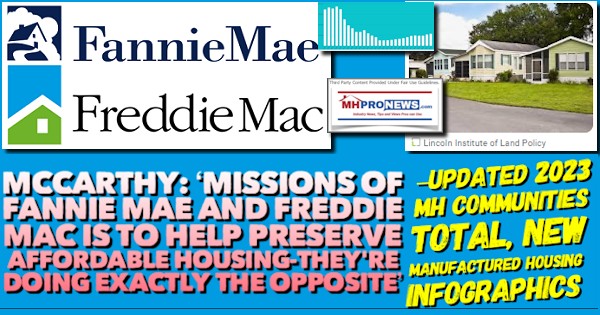
“The history of capitalism shows us that when low-income persons have a desperate need, exploiters will soon step in. As one mobile home park owner says, being the landlord for people like Jessica provides an enticing “sell to the masses, eat with the classes” opportunity,” said Quigley, in what might be – given the Jacobin republished his post – an allusion to socialism vs. capitalism. Note too that Quigley’s description on the Indiana University Law School website of his recent address said that he: “contributes to and helps edit the publications of the Religious Socialism working group of the Democratic Socialists of America.” If he is a socialist, Quigley might have better served his readers if he had drawn clear distinctions between so-called vulture capitalists and the types of individually owned “mom and pop” family business style locations. Why? Because the later group of smaller family-owned enterprises are not normally the subject of the kinds of consumer complaints that Rolfe, Reynolds, RHP Properties, Havenpark Capital, Flagship Communities, Equity LifeStyle Properties (ELS), and others in manufactured home communities are accused of engaging in. More on that is found in the report linked immediately below. Since socialists and progressives often talk about equity and justice, it is arguably unjust to lump in with ‘predatory’ companies consolidating the manufactured home industry with those “mom and pop” operations who may have a positive working relationship with their residents.
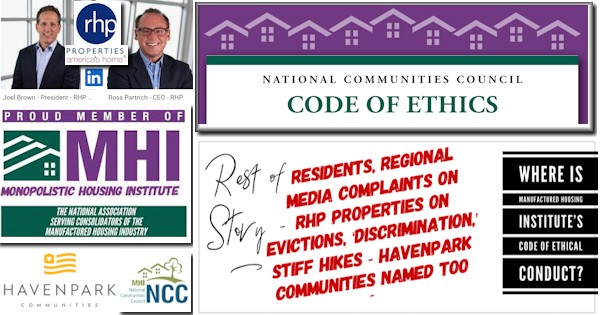
Attorneys know that facts, terminology, and specific evidence are relevant in any legal dispute. As a law professor, that noted, Quigley’s thesis may benefit from tightening up the terminology and by drawing bright line distinctions between business operators who are willing to take advantage of their residents and those thousands of individually owned manufactured home communities whose owners may never think of behaving in a predatory fashion. While there are examples of “predatory” operators in his state, Quigley might have noted that there are examples of honorable businesses in his state too (see the report linked below with an example).
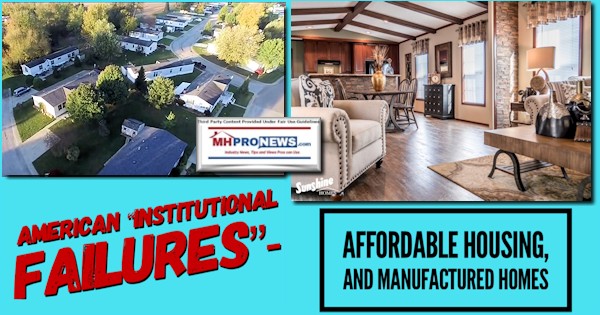
The contrast between what the Fath family has been doing at their land lease community in Indiana for generations and what Frank Rolfe, Dave Reynolds, and others of their ilk do is significant.
A ‘mom and pop’ family operation above vs. the ‘Frank and Dave’ corporate –
‘predatory’ approach reported by NatGeo and others below.
As one example of Quigley oddly referencing Rolfe and Reynold’s problematic “Mobile Home U” for data that has been demonstrated to be less than accurate by authentic manufactured home residents who advocate on behalf of their members. In fairness, such glitches in Quigley’s presentation don’t destroy some of his contentions. But it does raise questions that could be avoided if the law professor revised and reworded his post.
That noted, Quigley aptly said: “Some of the world’s wealthiest people have noticed. Investment firms like Blackstone, Apollo Global Management, the Carlyle Group, and Stockbridge Capital Group all have bought large interests in mobile home parks. Warren Buffett owns both the largest manufacturer of mobile homes and some of the largest holders of the high-interest mobile home purchase loans.” MHLivingNews and MHProNews have each published numerous articles on the concerns raised by the business practices of Buffett and some of the firms Quigley’s post cited. A few linked reports will illustrate that point.

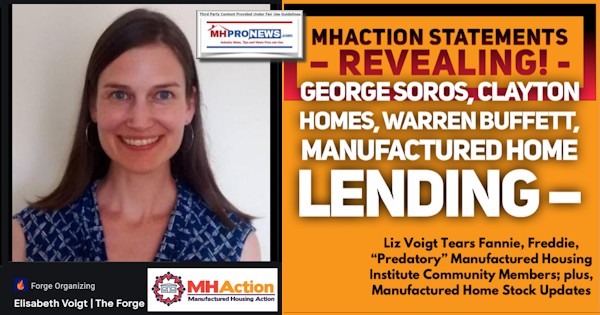

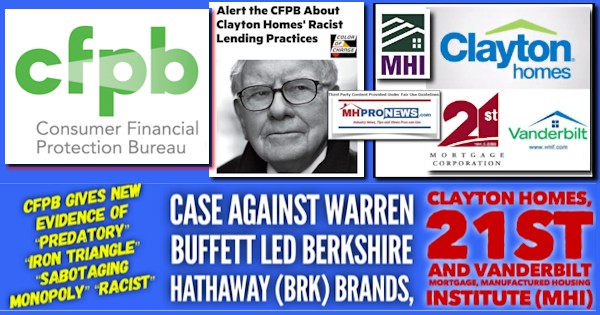
Quigley points to four possible action steps that could benefit manufactured home community residents.
- 1) Good cause requirements for lease nonrenewal or eviction.
- 2) Rent control.
- 3) Protected rights for residents to purchase mobile home parks.
- 4) Funding to support residents’ purchasing of mobile home parks. ##
Part II – Additional Information with More MHLivingNews Analysis and Commentary
Whatever his political leanings may be, socialist or not, Quigley is arguably correct in much of what he asserted. However, as with anyone who mixes accurate and inaccurate information, the inaccuracies undermine what he alleged that is often demonstrably true, supported by evidence and by common sense. Starting with his featured image, the home depicted in his Substack post is of a mobile home, not a manufactured home. Ironically, the Jacobin’s version of Quigley’s post also has errors, showing an RV, some dwellings that may be manufactured homes, and one which may be a mobile home – all while using the term “mobile home” in their version of his post’s title.
For instance. Quigley raised the notion of rent-control. A manufactured homeowner who was a volunteer resident advocate addressed that topic in some depth in the report linked below. Robert Van Cleef sought to strike a balance between blanket rent control, which is proven not to always work as advertised, while safeguarding resident rights and interests.
Manufactured Home Community Leader Discusses – Manufactured Housing Insanity?
To some of the points made by Robert “Bob” Van Cleef that relate to resident owned communities and rent control, manufactured home resident-advocate Paul Bradley told MHProNews the following on that topic. It is not as black and white as Quigley’s post suggests.
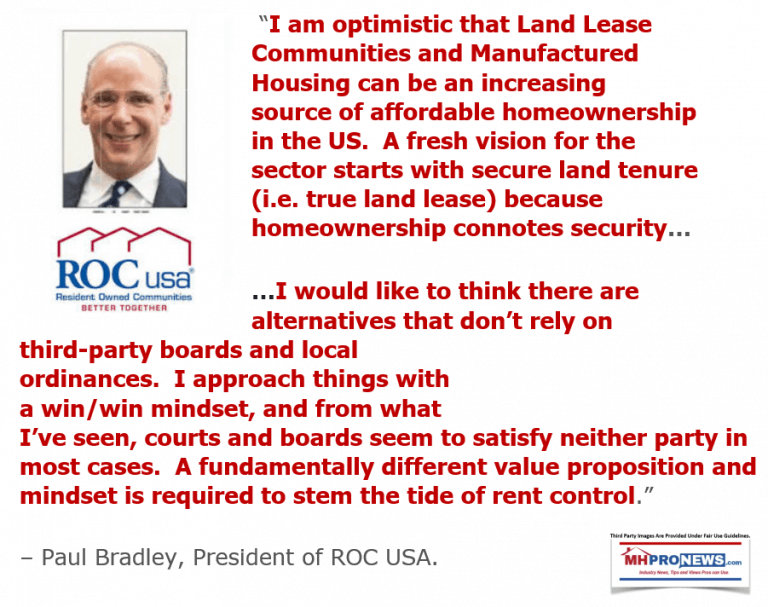
Several factors are involved in the troubling issues he has outlined. They are often caused by deep pocketed investors that are buying out mom and pop operations, which routinely have a good relationship with their residents, and the “predatory” firms that are often members of the Manufactured Housing Institute (MHI). But as Samuel “Sam” Strommen with Knudson Law detailed in his heavily footnoted and well reasoned research, holding those firms and the MHI nonprofit accountable for their respective roles in the issues he, Quigley, and others raised may be a more effective approach. Note Strommen and Quigley both pointed to some of the same problematic concerns, but Strommen points to the possible value of using antitrust and other actions to correct what has gone awry in the manufactured home market, including, but not limited to the manufactured home community (MHC) sector. Strommen also does a reasonably good job of using terminology in a consistent manner.
When the issue is in part one of supply and demand, it should be apparent that more supply is part of the solution. But Quigley is correct in saying that the significant cost of moving a manufactured home creates an issue that also should be considered and addressed. That noted, proper support for the resale market could be a big step forward. After all, conventional housing owners don’t consider ‘moving’ their homes. While it is not common knowledge in much of the country, there are conventional houses built on a land lease in places such as parts of the Chicago metro, Hawaii, Florida, and in Maryland. Furthermore, commercial buildings are often on land-lease. How that lease is structured is the key to how wise or risky that proposition may be. So, if Quigley and others want to provide more security for those in the manufactured home community sector, it is useful to acknowledge that conventional ‘site built’ housing and commercial real estate dealt with these issues years ago and are perhaps sometimes more successful at it. But it would be an overstatement to suggest that conventional housing is problem free. Site-built multifamily condominium housing projects and sometimes overzealous home owner associations (HOAs) are examples of how conventional real estate has parallels to what occurs with predatory MHC operators.
MHLivingNews has invited Professor Quigley to respond to certain questions posed to him today via email. As those inquiries occurred during the weekend, we have offered to share his response and feedback on this report, should he so desire. More on that another time, hopefully, in the near term.
Notice: the graphic below (and some others herein) can be expanded to a larger size.
See the instructions below the graphic below or click the image and follow the prompts.



Summary and Conclusion
There are numerous mainstream media reports, as well as those published here on MHLivingNews/MHProNews, that have tracked the kinds of concerns raised by Quigley. Some state officials have attempted to act at various times and in different ways. Private attorneys have also acted at times on behalf of manufactured homeowners troubled by predatory operators by suing a company involved in such allegations.
Manufactured home living includes, but is not limited to, living in manufactured home communities. This writer has at times, as have millions of others, lived in peaceful enjoyment of their manufactured home in a land lease where the owner-operators was reasonable. It is thus wise to do one’s homework well in advance of a purchase or lease. To learn more, see the related reports. Because Quigley is correct about this, there are reasons for hope so long as enough individuals act in a prudent and well-informed manner. ##


That’s a wrap on this installment of “News through the lens of manufactured homes and factory-built housing” © where “We Provide, You Decide.” © ## (Affordable housing, manufactured homes, reports, fact-checks, analysis, and commentary. Third-party images or content are provided under fair use guidelines for media.) (See Related Reports, further below. Text/image boxes often are hot-linked to other reports that can be access by clicking on them.)

By L.A. “Tony” Kovach – for MHLivingNews.com.
Tony earned a journalism scholarship and earned numerous awards in history and in manufactured housing. For example, he earned the prestigious Lottinville Award in history from the University of Oklahoma, where he studied history and business management. He’s a managing member and co-founder of LifeStyle Factory Homes, LLC, the parent company to MHProNews, and MHLivingNews.com. This article reflects the LLC’s and/or the writer’s position, and may or may not reflect the views of sponsors or supporters.
Connect on LinkedIn: http://www.linkedin.com/in/latonykovach
Recent and Related Reports:
The text/image boxes below are linked to other reports, which can be accessed by clicking on them.
 manufacturedhomelivingnews.com Manufactured Home Living News
manufacturedhomelivingnews.com Manufactured Home Living News
































